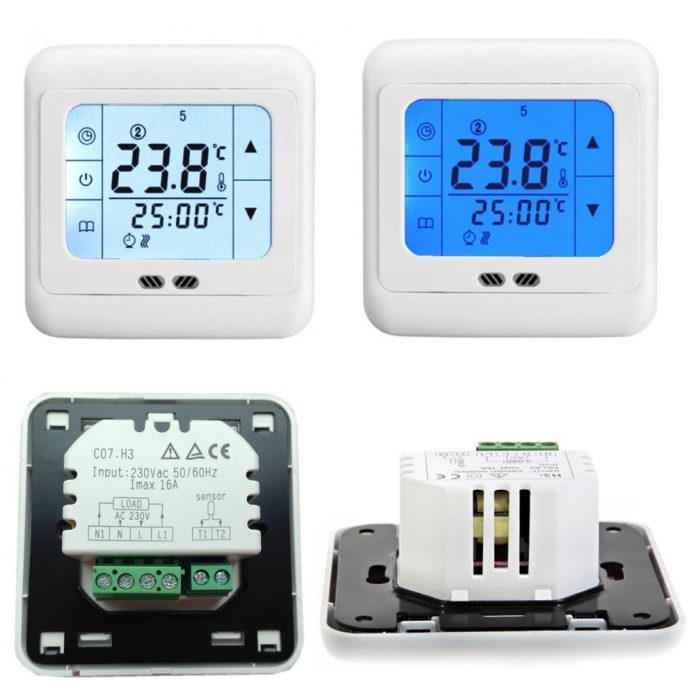It is most efficient to only heat your home to the required temperature and to let it cool down in the day time, when people are out and when everyone is in bed. A fully programmable thermostat will help maintain the perfect temperature and reduce energy bills. Can a thermostat go bad question will be completely ruled out with a programmable thermostat.
In today’s generation talking thermostat means it need to be wireless, digital, and easy to use. One of the leading names in controls for heating and air conditioning is Honeywell.
Versatile Programmable Thermostats for Heating
The heating can be programmed to turn on and off at different time and can be set for different temperatures at different times of the day. A new thermostat offering this amount of control over the heating can usually be added to an existing heating system.
When planning to install a new heating system there are further degrees of control that the resident might enjoy. Heating can also be designed in zones, allowing different settings for different areas of the building.
Thermostat for Furnaces and Forced Air Heating Systems
Many people mistakenly believe that it will be better to leave the heating on and the thermostat set to the same temperature all day and night.
Logic, physics and research show that the furnace does not work harder to warm the home from a lower temperature than it would have done to keep the home at a consistently high temperature. The U.S Department of Energy state that the longer the thermostat is set on a low temperature, and the lower the setting, the more energy will be saved. Saved energy, of course, means lower bills.
Room Thermostats and Thermostatic Radiator Valves
On central heating systems which combine boilers, water and radiators then a room thermostat is recommended even if there are thermostatic radiatior valves (TRVs) in place. This is because a thermostat will turn the boiler off when the temperature is reached. TRVs do not turn off the boiler, they simply turn down the heating on one radiator, the hot water continues to be pumped around the system.
What is the Best Thermostat Setting?
In contrast to the day time, most of us are more comfortable with a warmer temperature in the evening when we relax and the outside temperature drops. In the day we are likely to be more physically active and the house will also benefit from solar gain, that is, the natural warmth of sunlight through windows.
For most of the 24 hour day the heating could be switched off or down to a very low setting (for example,13 Centigrade or 55 Fahrenheit). The evening temperature could be raised to around 21 C (70 F). If there is a danger of the outside temperature dropping to near freezing then the heating should be kept on to keep the house warm.
Controlling the temperature of your home and the output of your heating system will make a substantial difference to energy use and fuel bills through the colder months. Heating can be controlled manually, for most people, however, a fully programmable thermostat will be more convenient.
The U.K. Building Regulations (Part L in England & Wales) stipulate a set of controls for central heating so that it will work efficiently and reduce wasted fuel and carbon emissions. Any new installations must comply with these regulations, this includes replacing a boiler on an existing heating system. The heating system, generally, must have thermostatic radiator valves (T.R.V.s) and timers for heating hot water.
The building regulations are generally concerned with the health and safety of people who use a building or who are near to it. Making buildings more efficient has been added to the agenda.
Timers, TRVs & Thermostats for Gas Central Heating SystemThe minimum requirement is as follows:
temperature control of space heating
temperature control of hot water system
an independent time line control of both the heating & hot water systems
a boiler interlock
In order to meet these requirements one would normally have:
A room or programmable thermostat;
Thermostatic radiator valves (T.R.V.s) in all other areas;
A cylinder thermostat controlling a zone or 3 port valve for stored hot water (not applicable to a combination boiler).
A timer
A boiler interlock ensures that the boiler and the pump switch off when there is no requirement for heat. This cannot be achieved by T.R.V.s but a room thermostat can perform this function.
Thermostatic Radiator Valves (TRVs)
TRVs are very simple controls fitted next to each radiator. When a temperature is reached the valve prevents hot water flowing into the radiator, it is by passed. This radiator will cool down but others on the circuit are unaffected.
Some heating systems will have TRVs on some but not all the radiators.
Independent Timers & Thermostatic Controls for Hot Water & HeatingTemperature controls and timers allow heating and hot water to be controlled independently of each other. The controls should allow maximum variations so that heating or hot water can be on or off at different times and temperatures set.
Remote Control, Portable and Digital Heating Controls
Technological advances mean that the controls can be digital and they can be portable working via remote control. Many users, however, will want something which is simple and intuitive to use; which does not require consultation with the user manual when any slight changes to temperature or times are to be made.
The Benefits of Simple Heating Controls
Reduce the overall amount of fuel used and wasted in the following way:
It is not necessary to have the boiler heating water to a higher temperature than is required;
Heating of radiators or hot water only takes place when needed;
Less heating rooms which are not used or at unnecessary times of day.
The benefits to the users or owners of buildings should be that the heating and hot water supply will be easier to use and cheaper to run. There is additional work involved in installing a heating system to current standards with all the controls but it may pay for itself.




